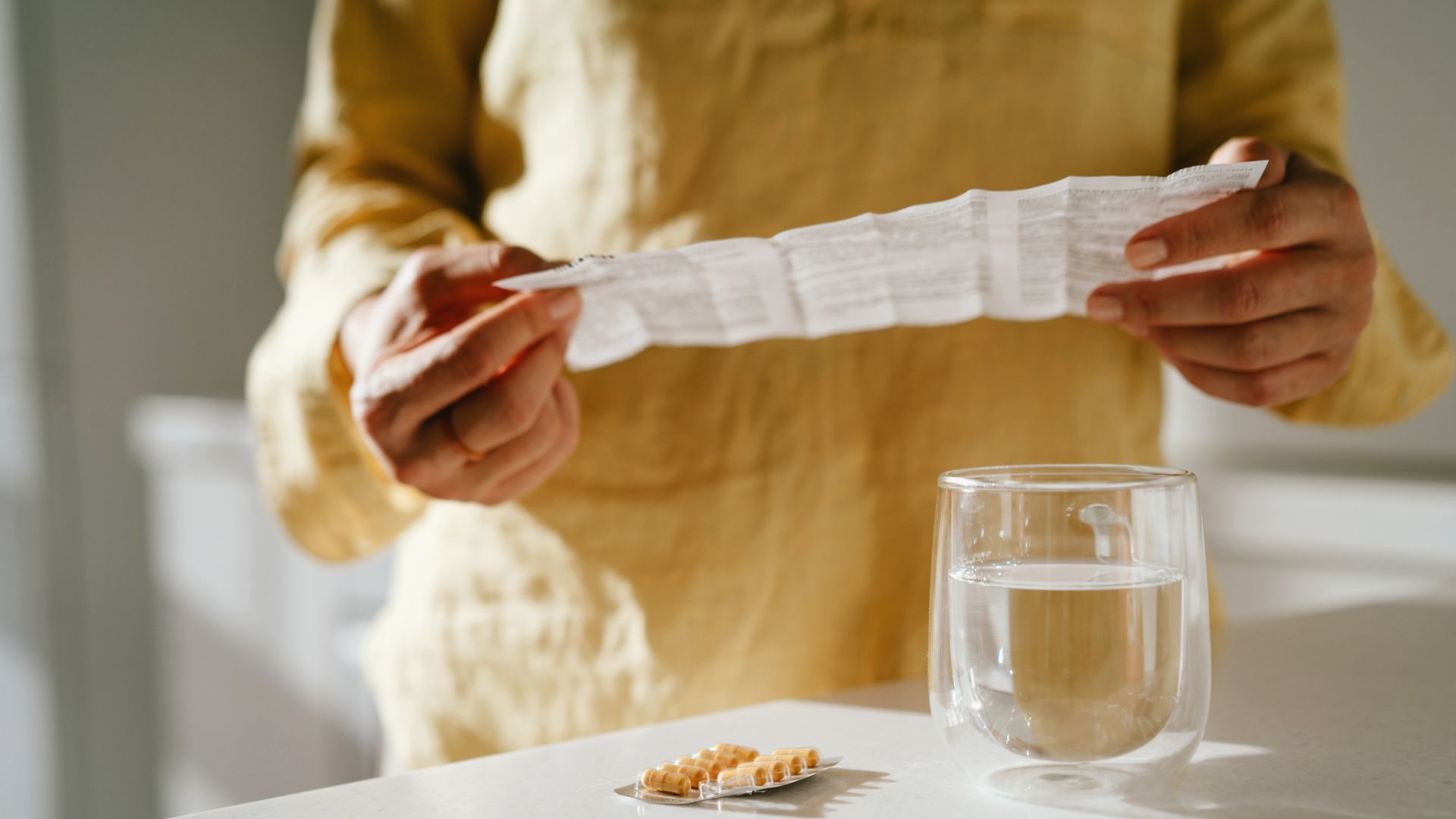What causes light spotting after menopause? 5 common reasons - and when to visit the doctor
The causes of light spotting after menopause can be nothing to worry about - but it's worth knowing when to see a doctor. Here, the experts reveal all


Given that menopause officially occurs 12 months after your last period, it's understandably concerning if you're seeing blood again - even if it's just light spotting. There are many causes of light spotting after menopause and while it can happen to anyone and is fairly common, it's always worth speaking to a doctor about.
While some bleeding during perimenopause is to be expected, any bleeding after menopause is known as postmenopause bleeding (PMB) - and is not normal. The causes can be benign and easily resolved, but even light spotting is a sign that something's up when you're postmenopausal.
"Anyone experiencing postmenopausal bleeding should get seen by a doctor. Even if it only happens once it needs to be checked out and it's not always a cause for alarm," says Dr Shirin Lakhani, a GP and women's health specialist. Here, woman&home speaks to several doctors to reveal the main causes of light spotting after menopause and what to do about it.
Causes of light spotting after menopause
1. Hormone changes
The ovaries make very little oestrogen after menopause but hormonal changes are still possible and can cause light blood spotting, says Dr Ashfaq Khan, a consultant obstetrician and gynaecologist.
"Hormonal fluctuations can occur due to factors like stress, certain medications, or underlying medical conditions," he says.
Just like in a pre-menopause menstrual cycle, high cortisol levels and mental health conditions such as depression, anxiety, and insomnia can affect hormones post-menopause.
Dr Ashfaq Khan is the clinical director of Harley Street Gynaecology. He is also the consultant obstetrician and gynaecologist, and lead clinician for Colposcopy and Vulva Disease at Whittington Hospital, London NHS, and the Director of Cervical Screening Program London (CSPL).
2. Medications
If you've started taking any new medications recently, it's worth looking at the side effects on the leaflet.
Sign up for the woman&home newsletter
Sign up to our free daily email for the latest royal and entertainment news, interesting opinion, expert advice on styling and beauty trends, and no-nonsense guides to the health and wellness questions you want answered.
"Changes in the dose of hormone therapy treatment (HRT) can lead to postmenopausal bleeding," Dr Lakhani says, as can some blood thinners and mental health medications.

Dr Shirin Lakhani MBBS MRCGP DRCOG is a GP, aesthetic physician, an award-winning cosmetic doctor, and the founder of Elite Aesthetics, with a significant voice of authority within the women's health space.

Changes in medication like HRT can be a common cause of light spotting after menopause.
3. Vaginal atrophy
Oestrogen is a hormone that contributes to skin thickness and the creation of collagen, the protein that makes up many of the body's tissues - including internal tissues. The decline of oestrogen during menopause can have the opposite effect and cause thinning, drying, and inflammation of the vaginal walls, leading to a condition known as vaginal atrophy.
"As an NHS and private GP, this is one of the non-serious reasons for post-menopausal bleeding that I frequently encounter," says menopause expert Dr Aarthi Sinha, who works with Church Crescent Medical. "The lining within the vagina becomes dry and cracked due to the lack of oestrogen and that can cause some bleeding."
The condition can also be made worse with friction. "Friction that may occur against [the walls] can lead to inflammation and break down of the tissue, which ultimately results in spotting or light bleeding after menopause," says Dr Tiffany Pham, an obstetrician and gynaecologist who works with Flo Health.
Those experiencing vaginal dryness and atrophy may benefit from vaginal oestrogen creams or hormone therapy treatment (HRT), which can replace the oestrogen in the body that's in decline, lessening these symptoms. It won't be suitable for everyone but this is something else to discuss with your doctor at the appointment.
Dr Aarthi Sinha has been a practising GP for almost 10 years since graduating from the Guy’s, King’s and St Thomas Hospital Trust – which is part of King’s College London. She has several dipolmas in gynaecology, sexual health and occupational medicine.

Dr Tiffany Pham is a board-certified obstetrician and gynaecologist and medical advisor for Flo Health, based in Houston, Texas. Pham is passionate about helping women access necessary health services and medically-accurate health information and better understand their bodies.
4. Infections
One of the other common causes of light spotting after menopause is infections, such as candida (otherwise known as a yeast infection), bacterial infections, or sexually transmitted diseases (STDs), says Dr Khan, the founder of Harley Street Gynaecology.
While these are all serious if they remain untreated, if diagnosed early, they can be nothing more than an uncomfortable inconvenience. Most infections can be treated at home with over-the-counter topical creams and/or antibiotics.
5. Abnormalities
While spotting after menopause can be an uncomfortable yeast infection for some people, one of the reasons it's so important to speak to your doctor - even if it only happens once - is that it can also be a sign of a serious problem.
"Spotting after menopause can sometimes be a sign of more serious issues such as uterine or cervical polyps, endometrial hyperplasia (thickening of the uterine lining), or even uterine or cervical cancer," says Dr Khan. "While less common, these conditions require medical attention."
If this is thought to be causing the spotting, your doctor or gynaecologist may do a physical exam, order blood tests, or do an ultrasound or a biopsy. From here, they can determine the causes and devise a treatment plan.
"Early detection and treatment of underlying conditions are essential for optimal health outcomes," he notes.
Is spotting normal during menopause?
No, any bleeding or spotting after menopause isn't normal, the experts agree, and you should always visit your doctor if you experience it even just once. "It's essential to consult a healthcare provider to determine the underlying cause," says Dr Khan.
It may be nothing to worry about. As Dr Pham says: "The most common reason for bleeding in menopause [vaginal atrophy] is typically benign, so it's not always a worrisome symptom."
Vaginal atrophy-related dryness and symptoms like itchy skin and pain during sex are very common - with around 50% of women who go through menopause thought to experience the issue - and are easily treated once diagnosed.
However, as noted, the more concerning causes are worth ruling out.
When to worry about spotting after menopause
You should see a doctor as soon as you notice any bleeding in the months or years after menopause, the experts say, but "especially if it persists or is accompanied by other symptoms such as pelvic pain, vaginal discharge, or bleeding during or after intercourse," says Dr Khan, as this is a sign of something more serious.
It's also important to see a doctor if:
- The spotting is persistent or recurrent.
- You're having heavy periods after 40.
- The bleeding is accompanied by clotting
- You experience pelvic pain or discomfort.
- You notice other concerning symptoms such as unexplained weight loss, fatigue, or changes in bowel or bladder habits.
Even if it is not blood spotting specifically, visit your doctor. "I would also recommend seeking advice if there is only a small amount of blood as well as pink or brown discharge," says Dr Lakhani.

Grace Walsh is woman&home's Health Channel Editor, working across the areas of fitness, nutrition, sleep, mental health, relationships, and sex. She is also a qualified fitness instructor. In 2025, she will be taking on her third marathon in Brighton, completing her first ultra marathon, and qualifying as a certified personal trainer and nutrition coach.
A digital journalist with over seven years experience as a writer and editor for UK publications, Grace has covered (almost) everything in the world of health and wellbeing with bylines in Cosmopolitan, Red, The i Paper, GoodtoKnow, and more.

